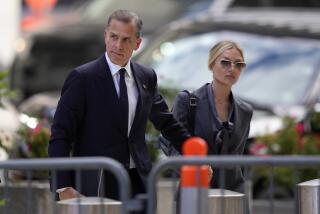Bonds charged with perjury
SAN FRANCISCO — Barry Bonds was indicted on perjury and obstruction of justice charges Thursday by a federal grand jury after a four-year inquiry on whether baseball’s all-time home run king lied under oath about his use of steroids.
Bonds, 43, became Major League Baseball’s career home run leader in August amid muted national acclaim because of widespread speculation that his late-career power hitting was artificially boosted by his connection to the infamous steroid distribution center known as the Bay Area Laboratory Co-Operative, or BALCO, in Burlingame, Calif.
The indictment against Bonds, who recently completed his last season with the San Francisco Giants, also disclosed for the first time that the slugger had tested positive for steroids “and other performance enhancing substances.” No further details were provided, but that revelation and the indictment figure to complicate Bonds’ efforts to negotiate a free-agent contract for next season.
At the same time, major questions persist about the strength of the prosecution’s long-delayed case. Much of the evidence appears to rely on the testimony of Bonds’ former personal trainer, Greg Anderson, who went to prison for refusing to cooperate with investigators.
Anderson was released Thursday, but Los Angeles attorney Mark Geragos said the trainer would not testify for or against Bonds.
If convicted, the seven-time National League most valuable player could face a maximum prison term of 30 years. He is charged with four counts of perjury and one count of obstruction of justice.
The indictment stems from a 2003 raid of BALCO by the Internal Revenue Service. BALCO founder Victor Conte later pleaded guilty to distributing steroids. Bonds, testifying under a grant of immunity, told a grand jury investigating the lab that he did not knowingly receive or use BALCO’s designer steroid products known as “the cream” and “the clear.”
In testimony previously leaked to the San Francisco Chronicle, Bonds said he believed one of the products was flaxseed oil, a claim met by widespread doubts. His critics noted that his home run total, which had never before topped 49 in one season, jumped to a record-breaking 73 in 2001.
The 11-page indictment portrays Bonds’ denials to four specific questions about obtaining steroids from Anderson as “unlawfully, knowingly, and contrary” to his oath to tell the truth during grand jury testimony in 2003.
In one such exchange, Bonds was asked whether he ever took “any steroids that he gave you.” Answer: “Not that I know of.”
In another, he was asked whether Anderson gave him anything “that you understood to be human growth hormone,” and Bonds answered: “No.”
“Q: And were you obtaining growth hormone from Mr. Anderson?
“A: Not at all.”
Bonds’ defense lawyer Michael Rains declined to answer questions Thursday about the charges, but he criticized the public release of the indictment.
“All you need to know about the government’s case is that they leaked an official indictment to every media outlet in America and withheld it from Barry, his lawyer, and everyone else who could read it and defend him,” Rains said.
He challenged the allegations as biased and predicted that Bonds would be acquitted.
“Now the public will get the whole truth, not just selectively leaked fabrications from anonymous sources,” he said.
“What we want to know is whether the media will spend as much time repairing Barry’s reputation as they have destroying it after he is proven innocent by a fair and impartial jury,” Rains said.
Bonds is scheduled to appear in U.S. District Court in San Francisco at 9:30 a.m. on Dec. 7.
The intrigue of the case is how the government will try to prove Bonds was lying. He did not deny taking steroids but denied doing so knowingly.
William Portanova, a Sacramento attorney who worked as a federal and state prosecutor for 17 years, said, “The government’s [argument] can’t be that he gained weight and his head got bigger. . . . The government has to prove to a jury of 12 unanimously beyond a reasonable doubt that Bonds knew.”
Portanova noted Anderson’s central role in the government’s criminal claims.
“One can only assume that the government must have some proof that they believe will contradict what Barry Bonds says he and Greg Anderson talked about. That would then follow that Greg Anderson could . . . be cooperating with the government.”
Anderson refused to testify before the grand jury, prompting a contempt of court citation. He was sent to federal prison in Dublin, Calif., where he remained until his release Thursday, one week shy of a full year in custody.
Attorney Geragos, who has represented Anderson throughout the case, contended Thursday that his client had neither shared new information nor had any plans to do so.
“Greg absolutely did not cooperate with the government about anything. It wouldn’t surprise me if [prosecutors] had nothing more than what they had a year ago, but they just wanted Greg to sit” in prison, he said.
Geragos said Anderson wouldn’t appear in any court proceedings. “Greg won’t testify for anybody about anything,” he said.
Prosecutors served notice that they regard Anderson as a potential witness whose contempt citation had not been “cured.” Assistant U.S. Atty. Jeffrey R. Finigan told the court Thursday that Anderson “continues to possess and refuse to produce evidence relevant to an ongoing grand jury investigation.”
BALCO founder Conte, who has named athletes who he said used his lab’s steroids -- among them sprinter Marion Jones, who last month admitted taking steroids -- was skeptical of the Bonds case.
In an e-mail response to questions, he told The Times: “I’m very surprised by the indictment of Barry Bonds. I certainly haven’t seen all of the evidence . . . however, I’ve seen a lot of it and I just don’t think there’s enough to meet the standard of beyond a reasonable doubt. They say it’s possible to ‘indict a ham sandwich’ and, unfortunately, I think it’s going to take a very long time for us to find out if that’s what they’ve done.”
Anderson’s importance in the case is clear throughout the indictment.
Under questioning by the BALCO grand jury, Bonds testified that he received “this cream” from Anderson in 2003.
“Greg came to the ballpark and he said, you know, ‘This will help you recover,’ and he rubbed some cream on my arm, like, some lotion-type stuff, and, like, gave me some flaxseed oil, that’s what he called it, called it some flaxseed oil, man. It’s like, ‘Whatever, dude,’ ” Bonds told the grand jury.
Asked when that happened for the first time, Bonds answered, “Not until 2003, this season.”
The indictment alleges that that response also was untrue.
Even before the indictment, Bonds faced a difficult time finding a job next season. The Giants told him in September they would not offer him a new contract.Although Bonds lives in Beverly Hills, neither the hometown Dodgers nor Angels had expressed any interest in signing him.
“If he didn’t have this problem, I think there would have been a couple of clubs that would have looked hard at him,” Oakland Athletics owner Lew Wolff said. “The guy has got pretty good numbers.”
Bonds finished last season with 28 homers, lifting his lifetime total to 762. He also had 66 runs batted in. He led the National League in the all-around offensive statistic of on-base and slugging percentage. And he needs only 65 hits to reach the baseball milestone of 3,000 for his career.”My numbers are good enough to play,” Bonds said in August, one day after he broke Hank Aaron’s all-time home run record of 755. “When I feel my numbers are not good enough, when I can’t compete on this level, it’s time to shut it down. My numbers are still in the top whatever of baseball.”
Major League Baseball Commissioner Bud Selig has considered whether to suspend Bonds upon a possible indictment, but he did not address that issue in a prepared statement released Thursday. With Bonds unsigned, there is no urgency for Selig to issue a suspension.
Said Selig: “I take this indictment very seriously and will follow its progress closely. . . . We will continue to work diligently to eradicate the use of all illegal performance-enhancing substances from the game.”
The baseball players’ union could challenge any suspension on Bonds’ behalf.
Major League Baseball Players Assn. Executive Director Donald Fehr said: “I was saddened to learn this afternoon of the indictment of Barry Bonds. However, we must remember, as the U.S. attorney stated in his press release today, that an indictment contains only allegations, and in this country every defendant . . . is entitled to the presumption of innocence.”
In Washington, White House spokesman Tony Fratto said: “The president is very disappointed to hear this.” President Bush, he added, called it “a sad day for baseball.”
Former Dodger first baseman Steve Garvey said: “It’s always going to be a sad day when anyone gets involved with a grand jury indictment. On the other hand, anytime you can get closer to an answer to the problem that has been such a dark cloud, the better it is for the game. I’m such a purist. Any time illegal substances are used to enhance performance, it taints the record.”
Reiterman reported from San Francisco, and Shaikin and Pugmire reported from Los Angeles.
More to Read
Sign up for Essential California
The most important California stories and recommendations in your inbox every morning.
You may occasionally receive promotional content from the Los Angeles Times.












